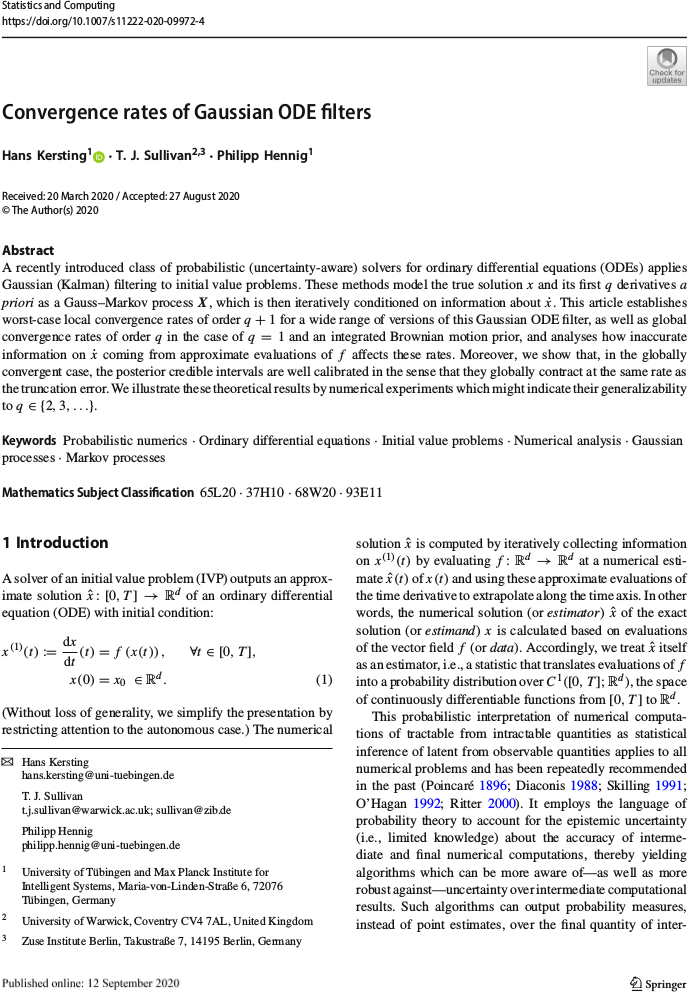#kersting

Convergence rates of Gaussian ODE filters in Statistics and Computing
The paper “Convergence rates of Gaussian ODE filters” by Hans Kersting, Philipp Hennig, and myself has just appeared in the journal Statistics and Computing. In this work, we examine the strong convergence rates of probabilistic solvers for ODEs of the form \(\dot{x}(t) = f(x(t))\) that are based upon Gaussian filtering. In some sense, this work combines the numerical analysis perspective of Conrad et al. (2016) and Lie et al. (2019) with the filtering perspective on probabilistic numerical methods for ODEs of Schober et al. (2014).
H. Kersting, T. J. Sullivan, and P. Hennig. “Convergence rates of Gaussian ODE filters.” Statistics and Computing 30(6):1791–1816, 2020.
Abstract. A recently introduced class of probabilistic (uncertainty-aware) solvers for ordinary differential equations (ODEs) applies Gaussian (Kalman) filtering to initial value problems. These methods model the true solution \(x\) and its first \(q\) derivatives a priori as a Gauss–Markov process \(X\), which is then iteratively conditioned on information about \(\dot{x}\). This article establishes worst-case local convergence rates of order \(q + 1\) for a wide range of versions of this Gaussian ODE filter, as well as global convergence rates of order \(q\) in the case of \(q = 1\) and an integrated Brownian motion prior, and analyses how inaccurate information on \(\dot{x}\) coming from approximate evaluations of \(f\) affects these rates. Moreover, we show that, in the globally convergent case, the posterior credible intervals are well calibrated in the sense that they globally contract at the same rate as the truncation error. We illustrate these theoretical results by numerical experiments which might indicate their generalizability to \(q \in \{ 2, 3 , \dots \}\).
Published on Tuesday 15 September 2020 at 09:00 UTC #publication #stco #prob-num #kersting #hennig
UQ Talks: Hans Kersting
Next week Hans Kersting (MPI Tübingen) will give a talk in the UQ research seminar about “UQ in probabilistic ODE solvers”.
Time and Place. Tuesday 14 June 2016, 12:15–13:15, ZIB Seminar Room 2006, Zuse Institute Berlin, Takustraße 7, 14195 Berlin
Abstract. In an ongoing push to construct probabilistic extensions of classic ODE solvers for application in statistics and machine learning, two recent papers have provided distinct methods that return probability measures instead of point estimates, based on sampling and filtering respectively. While both approaches leverage classical numerical analysis, by building on well-studied solutions of existing seminal solvers, the different constructions of probability measures strike a divergent balance between a formal quantification of epistemic uncertainty and a low computational overhead.
On the one hand, Conrad et al. proposed to randomise existing non-probabilistic one-step solvers by adding suitably scaled Gaussian noise after every step and thereby inducing a probability measure over the solution space of the ODE which contracts to a Dirac measure on the true unknown solution in the order of convergence of the underlying classic numerical method. But the computational cost of these methods is significantly above that of classic solvers.
On the other hand, Schober et al. recast the estimation of the solution as state estimation by a Gaussian (Kalman) filter and proved that employing a integrated Wiener process prior returns a posterior Gaussian process whose maximum likelihood (ML) estimate matches the solution of classic Runge–Kutta methods. In an attempt to amend this method's rough uncertainty calibration while sustaining its negligible cost overhead, we propose a novel way to quantify uncertainty in this filtering framework by probing the gradient using Bayesian quadrature.
Published on Monday 6 June 2016 at 10:00 UTC #event #uq-talk #prob-num #kersting